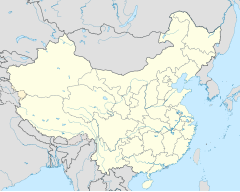Wuxi
|
Wuxi 无锡市 |
||
|---|---|---|
| Prefecture-level city | ||

Clockwise from top: Yunfu Mansion, Grand Buddha at Ling Shan, Lihu Lake, city canal, Liyuan Gardens
|
||
|
||
| Motto: "Wuxi is full of warmth and water" | ||
 Location of Wuxi City jurisdiction in Jiangsu |
||
| Location in China | ||
| Coordinates: 31°34′N 120°18′E / 31.567°N 120.300°ECoordinates: 31°34′N 120°18′E / 31.567°N 120.300°E | ||
| Country | China | |
| Province | Jiangsu | |
| County-level divisions | 9 | |
| Township-level divisions | 73 | |
| Government | ||
| • CPC Municipal Secretary | Li Xiaomin (李小敏) | |
| • Mayor | Wang Quan (汪泉) | |
| Area | ||
| • Prefecture-level city | 4,787.61 km2 (1,848.51 sq mi) | |
| Population (2010 Census) | ||
| • Prefecture-level city | 6,372,624 | |
| • Density | 1,300/km2 (3,400/sq mi) | |
| • Urban | 3,542,319 | |
| • Metro | 3,542,319 | |
| Time zone | China Standard (UTC+8) | |
| Postal code | Urban center: 214000 Other Area: 214200, 214400 |
|
| Area code(s) | 510 | |
| License plate prefixes | 苏B | |
| GDP (2014) | CNY 820.5 billion | |
| - per capita | CNY 126,400 | |
| HDI | 0.909 - very high | |
| Local Dialect | Wu: Wuxi dialect | |
| Website | www |
|
| Wuxi | |||||||||||||||||||||||||||||

"Wuxi" in Simplified (top) and Traditional (bottom) Chinese characters
|
|||||||||||||||||||||||||||||
| Simplified Chinese | 无锡 | ||||||||||||||||||||||||||||
|---|---|---|---|---|---|---|---|---|---|---|---|---|---|---|---|---|---|---|---|---|---|---|---|---|---|---|---|---|---|
| Traditional Chinese | 無錫 | ||||||||||||||||||||||||||||
|
|||||||||||||||||||||||||||||
| Transcriptions | |
|---|---|
| Standard Mandarin | |
| Hanyu Pinyin | Wúxī |
| Bopomofo | ㄨˊ ㄒㄧ |
| Gwoyeu Romatzyh | Wushi |
| Wade–Giles | Wu2-hsi1 |
| IPA | [ǔ.ɕí] |
| Wu | |
| Romanization | Ghu上 shiy平[ɦuɕiɪʔ] |
| Yue: Cantonese | |
| Yale Romanization | Mòuh-sik |
| Jyutping | Mou4-sik3 |
| Southern Min | |
| Hokkien POJ | Bû-sek |
Wuxi (Chinese: 无锡) is an old city in southern Jiangsu province, China. The city borders two other large cities, Changzhou to the west and Suzhou to the east, and borders Zhejiang Province as well in the south. It also covers a coastline of the Yangtze River in the north and two separate coasts of Lake Tai. Wuxi is well known for being one of the birthplaces of China's modern industry and commerce, as well as the hometown of many important businessmen who have played essential roles in building commerce in Shanghai since the early 20th century.
The modern name consists of the Chinese characters , literally translated "no tin". According to a myth, at the time of the Warring States, soldiers were stationed in Xishan ("tin hill") within Wuxi. While burying a pot to prepare food, a soldier found a stone plaque engraved with the words "If there is tin there is an army, there will be conflict under heaven. If there is no tin (wuxi), there will be peace under heaven," which may be the origin of the name.
However, some scholars believe the name may have been originated from "", meaning the "Ruins of Wu", due to Meicun's role as the original capital of the region. Another interesting theory suggests the city's name comes from a Chinese transcription of an indigenous Baiyue name honoring a bird deity. Others believe that the name could be derived from an ancient pronunciation of the name Fu Xi.
Former translations to English include Wu-shi, Wushi and Wu-hsi.
According to traditional Chinese historians, two Zhou princes, Taibo and Zhongyong, founded the first Chinese state in the area of Wuxi around the 11th century BC. This state of Wu (吳) had its first capital at Meili, generally thought to be the village of Meicun in Wuxi (although some records indicate a location closer to Wu's later capitals around Suzhou). Taibo and Zhongyong helped develop Wu's agriculture and waterways and the area soon flourished. Taibo died without an heir, and Zhongyong succeeded him as King of Wu. His descendants were later officially enfeoffed by the Zhou court as vassals before declaring themselves full kings again during the Spring and Autumn period.
...
Wikipedia


